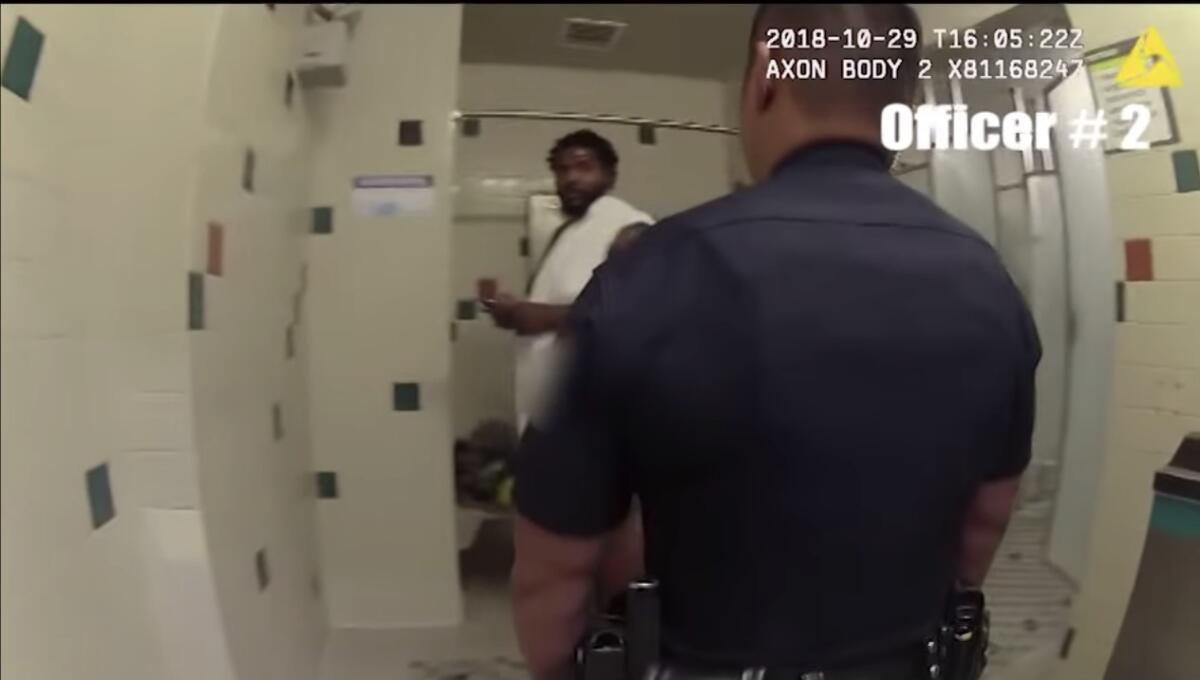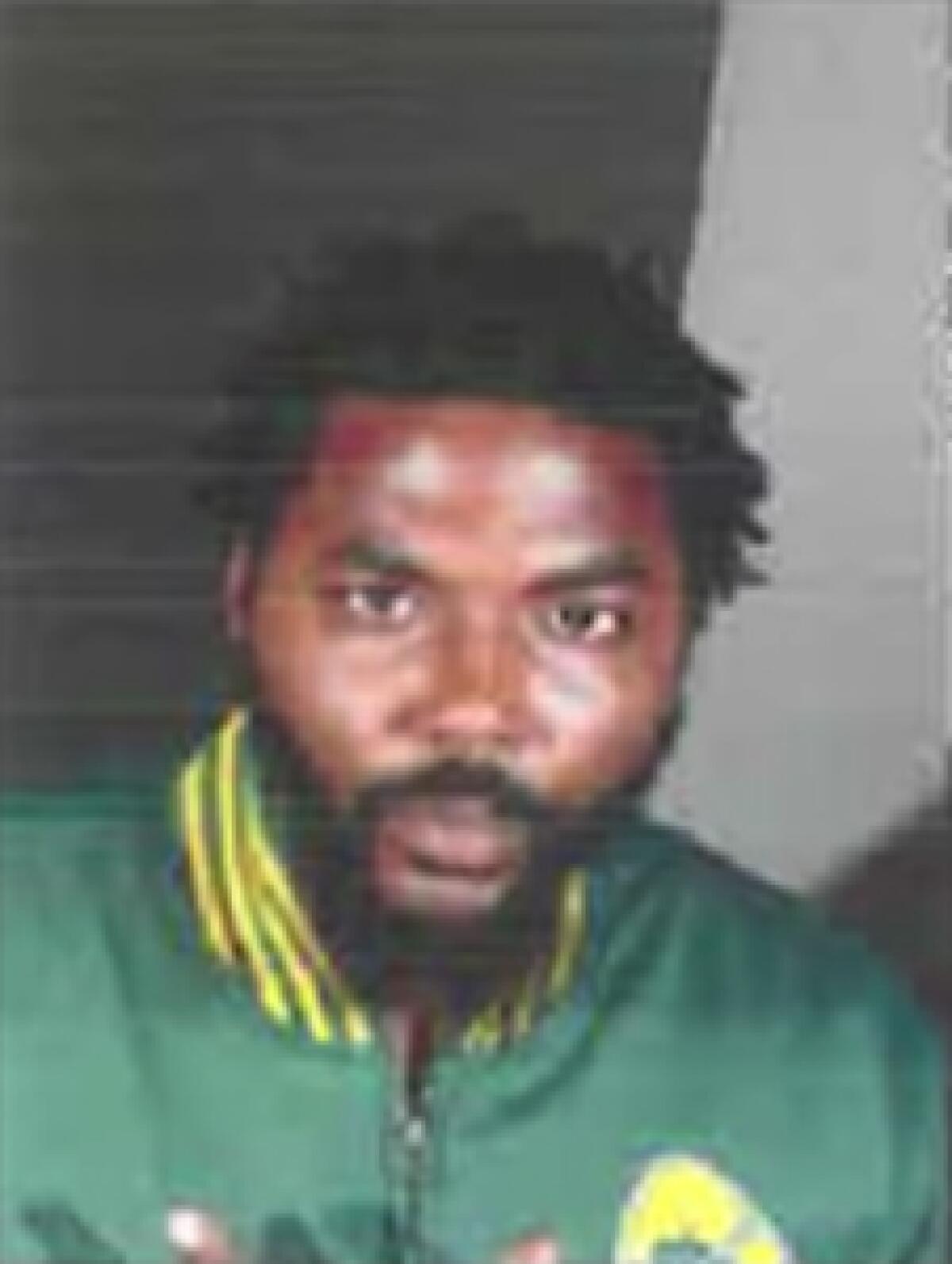9th Circuit rejects âqualified immunityâ as reason to toss LAPD gym shooting case

Enough is in dispute about the fatal Los Angeles police shooting of a man in a Hollywood 24 Hour Fitness gym in 2018 that the controversial judicial doctrine of âqualified immunityâ should not preclude a civil lawsuit filed by the manâs family from going before a jury, a federal appellate court ruled Friday.
The 2-1 ruling by a three-judge panel of the U.S. 9th Circuit Court of Appeals marked a victory for the family of 30-year-old Albert Dorsey, who suffered from mental illness and whose killing by LAPD Officer Edward Agdeppa after a struggle in the gymâs locker room sparked protests in L.A.
It also represented a win for advocates of police reform nationally, who have long viewed qualified immunity as one of the single largest barriers to police accountability in the U.S.
âWe are overwhelmingly pleased with the 9th Circuitâs decision to pull back on the scope of qualified immunity,â said Brian Dunn, an attorney for Dorseyâs mother, Paulette Smith, who brought the familyâs lawsuit.
A police officer violated department policy when he fatally shot a man in a locker room at a 24 Hour Fitness gym in Hollywood, the Los Angeles Police Commission ruled Tuesday.
Kevin Gilbert, an attorney for Agdeppa, did not respond to a request for comment Friday. The Los Angeles Police Department declined to comment.
Dunn said he expects Agdeppa to seek another review of the case by a larger âen bancâ panel of 11 circuit judges, which could reverse the three-judge panel, and to appeal if necessary to the more conservative U.S. Supreme Court â which has consistently upheld immunity for police officers in the past, including by reversing previous 9th Circuit decisions.
Dorseyâs killing has reverberated in L.A. for years, with activists still invoking his name when accusing the LAPD at street protests of a history of excessive force and brutality.
Dorsey was naked in the gym locker room and had been accused by security of trespassing and causing a disturbance when Agdeppa and another officer arrived and confronted him. They repeatedly tried to handcuff him without success â he was much bigger than them â and ultimately Tasered him multiple times before Agdeppa shot him.

The officers alleged that Dorsey had attacked them, and Agdeppa said he was in fear for his partnerâs life when he fired. Their account has been disputed from the start, in part based on a lack of visible physical injuries to the officers.
The officersâ body cameras were knocked to the ground before the shooting occurred, so they captured the sounds of the officers struggling with, Tasering and shooting Dorsey, but no video.
In 2019, the Los Angeles Police Commission found that Agdeppa violated department policy when he shot Dorsey, and that he and his partner should have de-escalated the situation and called for backup.
Smithâs case against Agdeppa came before the 9th Circuit after Agdeppa challenged a lower court decision rejecting his argument that qualified immunity protected him from any personal liability in the matter.
Writing for the Circuit Courtâs majority, Judge Morgan Christen, an Obama appointee, found that the lower court had been correct in ruling that a jury should consider whether Agdeppaâs use of deadly force âviolated clearly established lawâ â for two reasons.
First, the lower court ârecognized that a reasonable jury could reject the officersâ account of the shooting because there were significant discrepancies between their versions of events and other evidence in the record,â Christen wrote.
Second, the 9th Circuit has âlong held that the Fourth Amendment requires officers to warn before using deadly force when practicable,â and there was no evidence Agdeppa did so or was unable to do so, Christen wrote.
âIt is not our place to step into the juryâs shoes and we do not know what happened in the crucial interval before Agdeppa shot Dorsey,â Christen wrote.
Christen was joined by Judge Gary Feinerman, a federal district court judge from Illinois and a fellow Obama appointee assigned to the panel.
Circuit Judge Daniel Bress, a Trump appointee, dissented â writing that the âsplit-second decisionâ by Agdeppa presented âa classic case for qualified immunity.â
Bress wrote that the majority decision was âcontrary to law and requires officers to hesitate in situations in which decisive action, even if leading to the regrettable loss of human life, can be necessary to protect their own.â
He wrote that the court had never before applied the rule that officers must issue a warning before using deadly force while âin the throes of a violent altercation,â and the majority erred in doing so here.
Dunn said whatever may happen in the case moving forward, Fridayâs opinion bolsters the arguments of those challenging blanket applications of qualified immunity across the U.S.
âWhat the 9th Circuit said today is, âWeâre going to look at this case on its merits,ââ Dunn said.
More to Read
Sign up for Essential California
The most important California stories and recommendations in your inbox every morning.
You may occasionally receive promotional content from the Los Angeles Times.












